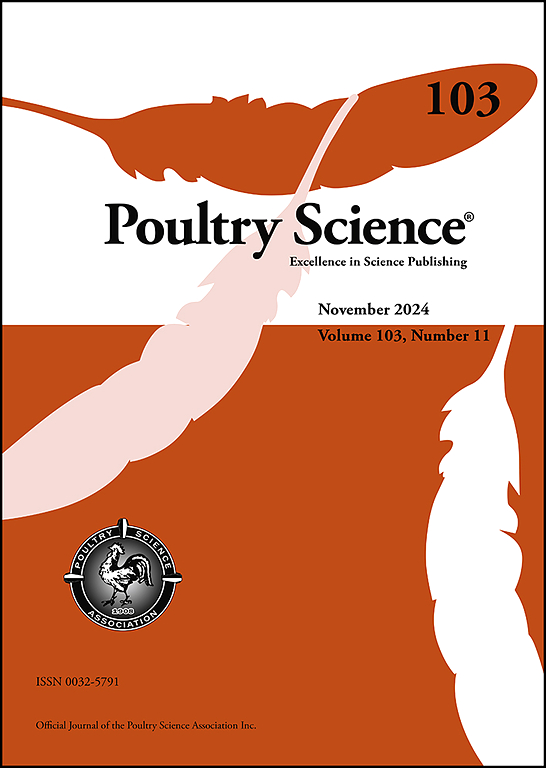Identification of SNPs and INDELS associated with duck egg quality traits through a genome-wide association analysis
IF 3.8
1区 农林科学
Q1 AGRICULTURE, DAIRY & ANIMAL SCIENCE
引用次数: 0
Abstract
Egg quality traits are economically important in the poultry industry. To explore the genetic architecture and identify potential candidate genes, a genome-wide association study (GWAS) was performed for 13 egg quality traits using data from whole-genome sequencing of 299 Longyan Shan-ma female ducks, including 12 quantitative traits and one qualitative trait, eggshell color (ESC; white, light green, green). From estimation of pedigree genetic parameters, heritability (h2) ranged from 0.022 to 0.996 for the 12 quantitative traits, with the highest h2 (0.996) for eggshell color a* value (ESCA) and the lowest h2 (0.022) for egg yolk percentage relative to EW. A total of 8,874 single nucleotide polymorphism (SNP)-based significant associations (1.0 × 10−6) and 247 insertion-deletion (indel)-based significant associations (1.00 × 10−5) were identified, including 5,980 SNPs and 159 indel markers. From 5,924 SNPs and 143 indels associated with ESC traits, 181 potential candidate genes were identified, and most significant SNPs and indels (P < 1.0 × 10−20) were located at 1.86 Mb (44.29−46.15 Mb) on chromosome 4. The top SNP (chr4:45325309:C>A; P = 7.97 × 10−43) and the top indel (chr4:45299595:delTTCCACTCCAC; P = 4.20 × 10−36) for the ESC a* value were within two known ESC candidate genes; ATP-binding cassette subfamily G member 2 (ABCG2) and protein kinase cGMP-dependent 2 (PRKG2). Of 56 SNPs and 16 indels associated with other egg quality traits, 46 potential candidate genes were identified including synapse differentiation-inducing 1-like (SYNDIG1L) for EW, and core histone macro-H2A.1 (LOC101795967) and neurogenin 1 (NEUROG1) for egg shape index; and four genes including collagen type VI alpha 3 chain (COL6A3), lysine demethylase 7A (KDM7A), LOC101802169, and sperm-associated antigen 16 (SPAG16) for egg yolk weight and the percentage of yolk to total egg weight. Of the 46 genes, the molecular functions of 22 are related to protein binding, indicating important roles in the formation of egg quality traits. Our findings provide new insight into the genetic basis of egg quality traits in ducks.
通过全基因组关联分析鉴定与鸭蛋质量性状相关的 SNP 和 INDELS
蛋品质性状在家禽业中具有重要的经济意义。为了探索其遗传结构并确定潜在的候选基因,研究人员利用299只龙岩山麻鸭的全基因组测序数据对13个蛋品质状进行了全基因组关联研究(GWAS),包括12个数量性状和1个质量性状蛋壳颜色(ESC;白色、浅绿色、绿色)。根据血统遗传参数估计,12个数量性状的遗传率(h2)在0.022至0.996之间,其中蛋壳颜色a*值(ESCA)的遗传率最高(0.996),蛋黄相对于EW的百分比的遗传率最低(0.022)。共鉴定出8874个基于单核苷酸多态性(SNP)的显著关联(1.0 × 10-6)和247个基于插入缺失(indel)的显著关联(1.00 × 10-5),包括5980个SNP和159个indel标记。从与 ESC 性状相关的 5,924 个 SNP 和 143 个 indel 中,鉴定出 181 个潜在候选基因,其中最显著的 SNP 和 indel(P < 1.0 × 10-20)位于 4 号染色体上的 1.86 Mb(44.29-46.15 Mb)处。ESC a*值的最高SNP(chr4:45325309:C>A; P = 7.97 × 10-43)和最高indel(chr4:45299595:delTTCCACTCCAC; P = 4.20 × 10-36)位于两个已知的ESC候选基因内:ATP结合盒G亚家族成员2(ABCG2)和依赖cGMP的蛋白激酶2(PRKG2)。在与其他蛋品质性状相关的 56 个 SNPs 和 16 个 indels 中,确定了 46 个潜在候选基因,包括 EW 的突触分化诱导 1-like (SYNDIG1L) 和核心组蛋白宏-H2A.1 (LOC101795967)(LOC101795967)和神经原蛋白 1 (NEUROG1);以及四个候选基因,包括六型胶原蛋白α3 链 (COL6A3)、赖氨酸去甲基化酶 7A (KDM7A)、LOC101802169 和精子相关抗原 16 (SPAG16),它们与蛋黄重量和蛋黄占鸡蛋总重量的百分比有关。在这 46 个基因中,22 个基因的分子功能与蛋白质结合有关,这表明它们在蛋品质性状的形成中发挥着重要作用。我们的研究结果为了解鸭蛋品质性状的遗传基础提供了新的视角。
本文章由计算机程序翻译,如有差异,请以英文原文为准。
求助全文
约1分钟内获得全文
求助全文
来源期刊

Poultry Science
农林科学-奶制品与动物科学
CiteScore
7.60
自引率
15.90%
发文量
0
审稿时长
94 days
期刊介绍:
First self-published in 1921, Poultry Science is an internationally renowned monthly journal, known as the authoritative source for a broad range of poultry information and high-caliber research. The journal plays a pivotal role in the dissemination of preeminent poultry-related knowledge across all disciplines. As of January 2020, Poultry Science will become an Open Access journal with no subscription charges, meaning authors who publish here can make their research immediately, permanently, and freely accessible worldwide while retaining copyright to their work. Papers submitted for publication after October 1, 2019 will be published as Open Access papers.
An international journal, Poultry Science publishes original papers, research notes, symposium papers, and reviews of basic science as applied to poultry. This authoritative source of poultry information is consistently ranked by ISI Impact Factor as one of the top 10 agriculture, dairy and animal science journals to deliver high-caliber research. Currently it is the highest-ranked (by Impact Factor and Eigenfactor) journal dedicated to publishing poultry research. Subject areas include breeding, genetics, education, production, management, environment, health, behavior, welfare, immunology, molecular biology, metabolism, nutrition, physiology, reproduction, processing, and products.
 求助内容:
求助内容: 应助结果提醒方式:
应助结果提醒方式:


